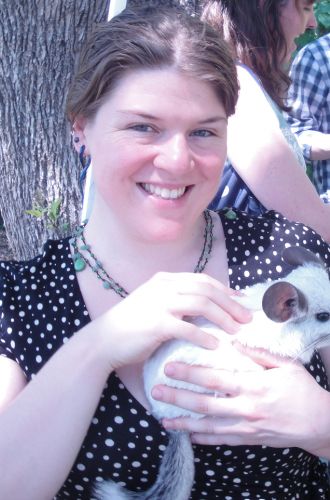-

-
Amelia W Hall
I am a 5th year graduate student in the Iyer lab. At present, I study epigenetic regulation in brain cancer.-
Before beginning graduate school, I worked as a technician in Dr. Richard Aldrich's laboratory in the department of neuroscience at UT from 2007-2010. While the lab's focus was on ion channel biophysics, I primarily did molecular biology and protein biochemistry work. This culminated in my development of a protocol for introducing a non-natural amino acid into the calcium binding site of heterologusly expressed calmodulin. At present, I am working on a computational collaboration with members of the Aldrich lab to better understand what sequence variation is tolerated in calmodulin across a wide variety of phyla and what function effects this sequence variation confers.
Prior to my work with the Aldrich lab, I worked as a undergraduate research assistant with Dr. Vera Gorbunova and Dr. Andrei Seluanov at the University of Rochester. My primary work was on the effects of exogenous stressors on DNA repair efficency in normal human fibroblasts. I additionally worked on characterizing primary rodent cell lines to better understand the relationship between life-span, telomerase expression and body mass. I graduated from Rochester in 2007 with a B.S. in Molecular Genetics.
Before I began biological research, I worked in IT, mainly in web design, graphic design and media editing. These early experiences prepared me for the computational biology and bioinformatic approaches I am presently learning.
-
I am currently a 5th year student in the Iyer lab, studying epigenetic regulation in brain cancer (glioblastoma multiforme). I am also working on projects related to chromatin archiecture and topology in brain cancer cell lines, identification and correction of bias in ChIP-seq data and the contributions of specific SNPs to treatment of atrial fibrillation.
Over the last couple of years, I optimized a protocol for performing ChIP-seq in solid tissue tumor samples. Having obtained large masses of epigenetic data on brain tumors, I am presently learning different ways of understanding, analyzing and presenting this data. I primarily code in Python, but am also proficient at unix, and additionally use mySQL and R to organize and display my analysis.
-
Shpak M., A.W. Hall, M. Goldberg, D. Z. Derryberry, Y. Ni, V.R. Iyer, and M. C. Cowperthwaite, 2014. An eQTL analysis of the human glioblastoma multiforme genome. Genomics 2014 Apr;103(4):252-63
Ni Y., A.W. Hall, A. Battenhouse, and V.R. Iyer, 2012. Simultaneous SNP identification and assessment of allele-specific bias from ChIP-seq data. BMC Genetics. 13:46.
Li W., D.B. Halling, A.W. Hall, and R.W. Aldrich. 2009. EF hands at the N-lobe of calmodulin are required for both SK channel gating and stable SK-calmodulin interaction. J. Gen. Physiol. 134(4):281-93.
Seluanov A., C. Hine, M. Bozzella, A. Hall, T.H. Sasahara, et al. 2008. Distinct tumor suppressor mechanisms evolve in rodent species that differ in size and lifespan. Aging Cell. 7:813-23.
-
May 2014: Best Graduate Student Poster, Big Data in Biology 2nd Annual Symposium. Poster title: "Epigenetic Profiling and Clustering of Glioblastoma Multiforme."
September 2012: Ethel and Robert L. Terry Memorial Scholarship
March 2012: Joseph F. Short Memorial Biology Endowed Fellowship
March 2010: UT Austin Graduate Recruitment Fellowship
-
May 2014: Poster: Epigenetic Profiling and Clustering of Glioblastoma Multiforme, 2nd Annual Big Data in Biology Symposium.
November 2013: Presentation: Optimizing ChIP in Cell Lines and Solid Tumors, MD Anderson Cancer Center at Science Park
November 2013: Poster: Epigenetic and transcriptional profiling in Glioblastoma Multiforme, Lost Pines Conference 2013, MD Anderson Cancer Center at Science Park
September 2013: Poster: Epigenetic and transcriptional profiling in Glioblastoma Multiforme, ICMB Departmental Retreat
-
- Advanced Microbial Biochemistry and Metabolism (391R)
- Genetics (395F)
- Cell Biology (395H)
- Molecular Biology (395J)
- Elements of Computers and Programming (303E)
- Bioinformatics (391R)
- Virology (391P)
-














